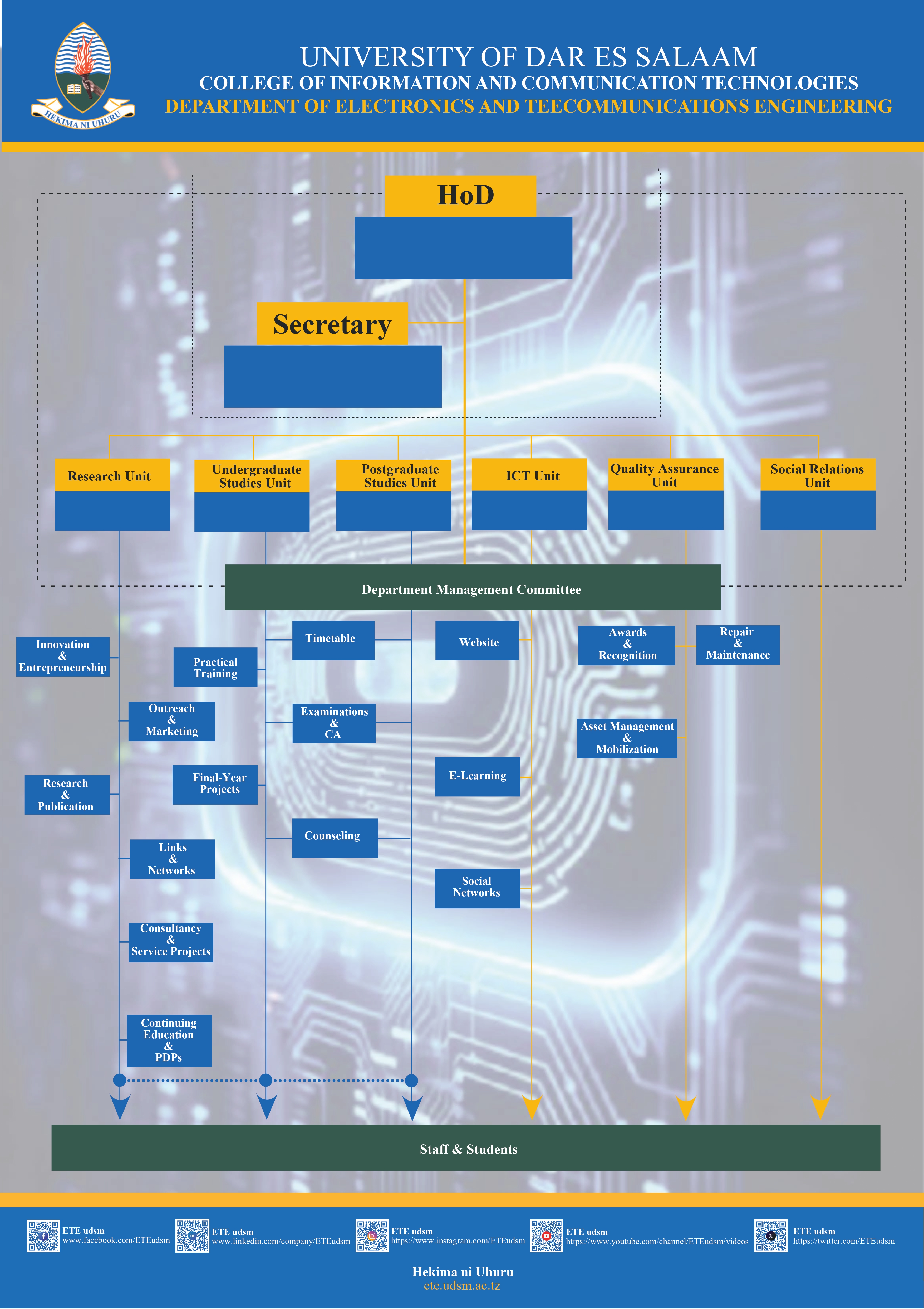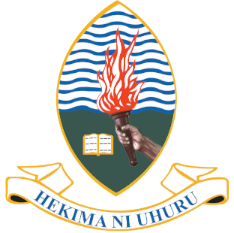Governance
Overview
In order to streamline operations and allow for effective governance, our department is organized info five integral components: Research Unit (RU), Undergraduate Studies Unit (UGSU), Postgraduate Studies Unit (PGSU), ICT Unit (ICTU), Quality Assurance Unit (QAU), and Social Relations Unit (SRU). These components, each headed by a coordinator, are interconnected and are collectively coordinated by the Head of Department. The organizational structure of the department aligns with that of the institution, the goal being to facilitate governance and effective flow of information and directives between the department and other institutional structures, including those of the college. The coordinators of RU, UGSU, PGSU, ICTU, QAU, and SRU as well as Secretary and Head of Department constitute a Department Management Committee.
The committee meets regularly to discuss and make decisions on various management issues of the department. The decisions from the committee are inputs to the general or special departmental meetings of all staff, organized according to the university Almanac. Generally, the department holds two meetings annually, one for each semester. In some cases, however, there could be extraordinary (special) meetings. Matters from these meetings are propagated upwards through the college.
Research Unit
The research unit comprises of the following sections: research and publications; innovation and entrepreneurship; consultancy and service projects; continuing education and professional development programs; links and networks.
The specific responsibilities of the Research Unit sections are as follows:
Research and publications
- Encourage and motivate staff of the department to do research and generate quality publications in refereed journals;
- Organize and conduct internal trainings regarding vetting and promotion processes of the University of Dar es Salaam, including compilation of publications;
- Share with staff all communications and materials that can assist them to do research and publish;
- Ensure that all staff have properly registered into reputable scholarly engines and publication identification systems, including, but not limited to, Google Scholar and ORCID;
- Institute a teamwork and research culture, and ensure that staff of the department undertake multidisciplinary research and publish co-authored papers;
- Report quarterly activities of the section to the SRKEC;
- Respond to all queries from staff regarding research and publications;
- Develop creative and innovative strategies to ensure that staff do research and produce quality publications;
- Manage all research groups of the department and, ensure that the research groups remain actively strong;
- Establish new research groups according to the demands and direction of the department;
- Facilitate growth of research groups, including making them advance to the research centers of excellence;
- Establish Professorial Chairs in the fields of expertise of the department;
- Create awareness to staff regarding Scholarly Publication and Dissemination Policy ad Guidelines as well as Guidelines for the Assessment of Academic Staff Performance;
- Track and record research activities and publications of staff and, if applicable, encourage staff with sufficient publication points to apply for promotions to various academic or research ranks, guiding them whenever they need support on the application procedures;
- Ensure that all staff are registered in the UDSM Research Information Management System (RIMS)[1] and the UDSM Research Repository[2], and that their profiles in these systems are regularly updated;
- Create awareness to staff regarding mechanisms, processes, and procedures on vetting of publication media by the respective organs of the university, including the University Publication Committee;
- Inform staff on the available opportunities in research, publication, and scientific writing; and
- Encourage women to be frontiers in research and publications.
Innovation and entrepreneurship
- Ensure establishment and effective operation of the innovation and entrepreneurship students’ club of the department;
- Collaborate with other innovation and entrepreneurship units of the university, including Youth for Change (Y4C) and University of Dar es Salaam Innovation and Entrepreneurship Center (UDIEC), to ensure innovators and entrepreneurs of the department receive attention and support;
- Enhance visibility of the department through her innovation and entrepreneurship activities;
- Represent the department in all innovation and entrepreneurship activities;
- Identify final-year projects that can further be advanced to generate complete innovative products and services, and report such projects to the Head of Department;
- Work with UDIEC, through the respective coordinators of the college, to ensure that innovations of the department are advanced and converted into complete products;
- Ensure that staff and students of the department receive regular training on innovation and entrepreneurship;
- Collaborate with respective organs of the university to facilitate students and staff to register patents and copyrights of their innovative products and services;
- Track and record innovations of the departments;
- Collaborate with stakeholders and respective organs of the university to facilitate students with innovative ideas or products, such as those resulted from final-year projects, to establish spin-off companies and startups as per the UDSM Commercialization Policy;
- Report quarterly activities of the section to the SRKEC; and
- Ensure establishment and effective operation of a Creativity and Innovation Pool, an innovation management system that gives students of the department the opportunity to share their innovative ideas to the public.
Consultancy and service projects
- Develop effective strategies for staff of the department to fully participate in all consultancy and service projects;
- Find consultancy opportunities related to the areas of expertise of the department, and share such opportunities to staff members;
- To organize a team of experts from the department (or from other institutions) to write consultancy documents for submission to the respective organs;
- Ensure that the department receives funding from consultancy and service products through practical experience, knowledge, and expertise of the staff;
- Report quarterly activities of the section to the SRKEC;
- Create awareness of department staff on the Consultancy Policy and Operational Procedures as well as other related policies;
- Track and record all consultancy projects undertaken by staff of the department;
- Ensure that all staff of the department are properly registered in the UDSM Research and Consultancy Projects Management System[3] and CoICT Consultancy Bureau, and that their profiles are regularly updated; and
- Identify staff with higher volumes of consultancy projects or with highly funded projects, and report them to the Head of Department for appraisal and rewarding.
Continuing education and professional development programs
- Organize and coordinate all continuing education and professional development programs;
- Work closely with the Directorate of Public Services (DPS) to extensively advertise and market professional development programs (PDPs) of the department;
- Establish new PDPs that reflect vision of the department;
- Ensure that all continuing education and professional development programs of the department are registered into the CONRIS system[4].
- Report quarterly activities of the section to the SRKEC; and
- Ensure sustainability of professional development programs.
Outreach and marketing
- Develop, coordinate, organize, plan, and execute outreach programs;
- Collaborate with the DPS to ensure that the department promotes efficiently her programs, products, and services to the public;
- Develop creative and innovative strategies for the department to promote her programs, products, and services, thus increasing the visibility and impact of the department to the community;
- Organize and plan for exhibitions of products and services of the department (e.g., UDSM research week, Dar es Salaam International Trade Fair, Tanzania Industries, and Farmer’s Day);
- Ensure that the department fully participates in the local and international events for exhibition of her products and services; and
- Report quarterly activities of the section to the SRKEC.
Links and networks
- Establish strong and sustainable links with stakeholders (industries, companies, organizations, and institutions);
- Participate in the preparation of agreements or memorandum of understanding with stakeholders;
- Collect opinions from stakeholders regarding their perceptions on different programs of the department;
- Establish links and networks with graduates to further understand their entrepreneurship activities after studies;
- Identify and engage stakeholders with vision similar to those of the department;
- Report quarterly activities of the section to the SRKEC; and
- Device effective strategies to sustain healthy relationships with stakeholders.

